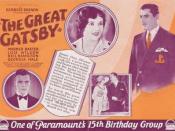As the narrator and therefore the authoritative "namer" of the Great Gatsby, Nick attempts to rectify Gatsby's image; he urges the reader to ignore Gatsby's social status and see him for the "great" man Nick wants him to be. But, Gatsby is a tragic figure stuck in the middle of two worlds. Gatsby's lack of familial ties and his apparent economic success alienate from the lower class to which he used to belong. This is also true of the members of the upper class who use Gatsby as a form of entertainment but nothing else: "... but no one swooned backward on Gatsby and no French bob touched Gatsby's shoulder and no singing quartets were formed with Gatsby's head for one link." (55). As a result of the duel hate from both sides of the economic spectrum, Gatsby must die. He is in fact, killed by members of both groups; his dearth is incited by Tom Buchanan, the old money millionaire, to George Wilson, the pinnacle of low class dreariness.
Nick tries to rescue Gatsby from this dishonorable death by reaching out to Gatsby twice more in the end: "I went out and looked at that huge incoherent failure of a house once more. On the white steps an obscene word, scrawled by some boy with a piece of brick, stood out clearly in the moonlight and I erased it..." (188). Here the house represents the failure of a life Gatsby maintained. Nick returns to try to wash away the stains implanted upon him but fails here and his final attempt in the naming of the book as well. Since the book is a retelling of Nick's accounts through his own eyes, it was a naming done after the sorrowful events of Gatsby's life and Nick's final...


